Food for thoughts
Dec. 14, 2023
Publications

♾️follow Marie-Anne Frison-Roche on LinkedIn
♾️subscribe to the Newsletter MAFR Regulation, Compliance, Law
____
► Full Reference: M.-A. Frison-Roche, "The "Judge-Judged". Articulating Words and Things in the face of Conflicts of Interest", in M.-A. Frison-Roche (ed.), Compliance Jurisdictionalisation, Journal of Regulation & Compliance (JoRC) and Bruylant, coll. "Compliance & Regulation", to be published
____
📝read the article
____
🚧read the bilingual Working Paper which is the basis of this article, with additional developments, technical references and hyperlinks
____
📘read a general presentation of the book, Compliance Jurisdictionalisation, in which this article is published
____
► Summary of the article (done by the Journal of Regulation & Compliance - JoRC): Since the topic of this article is part of a chapter devoted to the Company established as Prosecutor and Judge of itself by Compliance Law, chapter aiming to use the relevant qualifications, it is appropriate therefore to worry about the adjustment of words and things, of the way in which the relationship between ones and the others evolve, and of the more particular question of knowing if this evolution is radical or not when one speaks of "judge ".
because "judging" is a word that the Law has disputed with other disciplines, but that it has appropriated not so much to confer more powers on those who act in its name, for example that who supervise and punish, but on the contrary to impose limits, since to the one who judges it has put the chains of the procedure under foot, thus making bearable for the other the exercise of such a power. This is why those who want the power to judge would often want to not have the title, because having de jure the title of judge is being subject to the correlated regime, it is to be submitted to procedural correctness.
It is therefore to better limit that the Law sees who judges, for obliging this so-powerful character to the procedure. But the Law also has the power to appoint a judge and to fix the contours of all the characters in the trial. He usually does it with clarity, distinguishing the ones of the others, not confusing them. This art of distinction has constitutional value. Thus, not only the one who judges must be named "judge" but the procedural apparatus which goes with this character and which constitutes a way of doing things and fundamental rights, are not "granted" by kindness or in a second step: it is a block. If you didn't want to have to endure procedural rights, you didn't have to want to be a judge. Admittedly, one could conclude that the procedure would therefore have become "substantial"; by this elevation, it is rather a fashion of saying that the procedure would no longer be a "servant": it is a kind of declaration of love for the procedure, as long as one affirms that at the acts of judging , or investigating, or prosecuting, are "naturally" attached the procedural rights for the one who is likely to be the object of these powers.
Compliance Law, in search of allies to achieve the Monumental Goals for the aims of which it was instituted, will require, or even demand, private companies to go and seek themselves, in particular through investigations. internal or active vigilance on others, for finding facts likely to be reproached to them. Compliance Law will also require that they prosecute those who have committed these acts. Compliance La will again demand that they sanction the acts that people have committed in their name.
This is clearly understood from the point of view of Ex Ante efficiency. The confusion of roles is often very efficient since it is synonymous with the accumulation of powers. For example, it is more efficient that the one who pursues is also the one who instructs and judges, since he knows the case so well... Besides, it is more efficient that he also elaborates the rules, so he knows better than anyone the "spirit" of the texts. This was often emphasized in Regulatory Law. When everything is Information and risk management, that would be necessary ... But all this is not obvious.
For two reasons, one external and the other internal.
Externally, the first reason is that it is not appropriate to "name" a judge who is not. This would be too easy, because it would then be enough to designate anyone, or even to do it oneself to appropriate the regime that goes with it, in particular for obtain a so-called legitimate power for obtaining that others obey even though they are not subordinate or from them they transmit information, even though they would be competitors: it would then be necessary to remember that only the Law is able to appoint judge ; in this new Compliance era, companies would be judges, prosecutors, investigators! Maybe, if the Law says it, but if it didn't, it would be necessary to come back to this tautology ... But are we in such a radicalism? Moreover, do judges have "the prerogative" of judgment and the Law has not admitted this power for companies to judge for a long time? As soon as the procedure is there in Ex Ante and the control of the judge in Ex Post?
The second reason, internal to the company, situation on which the article focuses, is that the company investigates itself, judges itself, sanctions itself. However, the legal person expressing its will only through its organs, we underline in practice the difficulties for the same human being to formulate grievances, as he/she is the agent of the legal person, adressed to the natural person that he/she himself/herself is. The two interests of the two are not the same, are often opposed; how the secrets of one can be kept with respect to the other, represented by the same individual? ... It is all the mystery, even the artifice of legal personality that appears and we understand better that Compliance Law no longer wants to use this strange classical notion. Because all the rules of procedure cannot mask that to prosecute oneself does not make more sense than to contract with oneself. This conflict of interest is impossible to resolve because naming the same individual X then naming him/her Y, by declaring open the dispute between them does not make sense.
This dualism, which is impossible to admit when it comes to playing these functions with regard to corporate officers, can come back to life by setting up third parties who will carry secrets and oppositions. For example by the designation of two separate lawyers for the human being agent and the human being representative of the legal person, each lawyer being able to have secrets for each other and to oppose each other. These spaces of reconstitution of the so "natural" oppositions in procedure between the one who judges and the one who is judged can also take the technological form of platforms: where there is no longer anyone, where the process has replaced the procedure, there is no longer any human judgment. We can thus see that the fear of conflicts of interest is so strong that we resign ourselves to saying that only the machine would be "impartial", a derisory conception of impartiality, against which it is advisable to fight.
This then leads to a final question: can the company claim to exercise the jurisdictional power to prosecute and judge and investigate without even claiming to be a prosecutor, an investigating judge, or a court? The company's advantage would be to be able to escape the legal regime that classical Law attaches to its words, mainly the rights of the defense and the rights of action for others, the principle of publicity of justice for everyone, which expresses the link between procedure and democracy . When Facebook said on June 12, 2021 "react" to the decision of May 5, 2021 adopted by what would only be an Oversight Board to decide "as a consequence" of a 2-year suspension of Donald Trump's account, the art of qualifications seem to be used in order to avoid any regime constraint.
But this art of euphemism is very old. Thus the States, when they wanted to increase repression, presented the transformation of the system as a softening of it through the "decriminalization" of Economic Law, transferred from the criminal courts to the independent administrative agencies. The efficiency was greatly increased, since the guarantees of the Criminal Procedure ceased to apply. But 20 years later, Words found their way back to Things: under Criminal Law, slept the "criminal matter", which requires the same "Impartiality". In 1996, a judge once affirmed it and everything was changed. Let us therefore wait for what the Courts will say, since they are the masters of qualifications, as Article 12 of the French Code of Civil Procedure says, as Motulsky wrote it in 1972. Law has time.
________
Dec. 11, 2023
Thesaurus : 10. Autorité de la Concurrence
► Référence complète : Autorité de la concurrence (ADLC), décision n° 23-D-12 du 11 décembre 2023 relative à des pratiques mises en œuvre dans le secteur des thés de luxe
____
________
Dec. 10, 2023
Newsletter MAFR - Law, Compliance, Regulation

🌐follow Marie-Anne Frison-Roche on LinkedIn
🌐subscribe to the Newsletter MAFR Regulation, Compliance, Law
____
► Full Reference: M.-A. Frison-Roche, "Comment articuler Compliance et droits de la défense ?" ("How to articulate Compliance and rights of the defence"), Newsletter MAFR Law, Compliance, Regulation, December 10, 2023
____
📧Read by freely subscribing other news of the Newsletter MAFR - Law, Compliance, Regulation
____
🧱Acknowledging their specific characteristics to better articulate Compliance and the rights of the defence
The book, Compliance et droits de la défense (Compliance and the rights of the defence), co-edited by the Journal of Regulation & Compliance (JoRC) and Dalloz, deals with their relationship per se, a relationship illustrated by the internal investigation, the CJIP and the CRPC. Its aim is to explain what Compliance Law is and what the rights of the defence are, in order to find better ways of articulating them: sometimes to rank them, more often to find their points of contact and increase them. Above all, the starting point must be practice.
____
📧read the article published on 10 December 2023 on this topic in the Newsletter MAFR - Law, Compliance, Regulation ⤵️

Nov. 30, 2023
Organization of scientific events
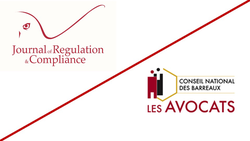
► Référence complète : M. Boissavy, H. Dehghani-Azar et M.-A. Frison-Roche (dir.), Journal of Regulation & Compliance (JoRC) et Conseil national des barreaux (CNB), Compliance, Vigilance et Médiation, Auditorium de la Maison du Barreau, 30 novembre 2023
____
► Présentation générale du colloque : Pour accroître le respect des droits humains et de l’environnement dans le cadre de la responsabilité sociale des entreprises et de la compliance, les pouvoirs publics et les entreprises mettent en œuvre depuis plusieurs années des instruments et processus de dialogue entre l’entreprise d’une part et les parties prenantes internes et externes à l’entreprise d’autre part. Parmi eux la médiation est régulièrement mise en avant comme étant un processus nécessaire et fécond pour trouver des accords bénéfiques tant pour les salariés et les acteurs de la société civile que pour l’environnement et la société globale.
John Ruggie, Représentant spécial du Secrétaire général chargé de la question des droits de l’Homme et des sociétés transnationales et autres entreprises, dans son rapport du 21 mars 2011, Principes directeurs relatifs aux entreprises et aux droits de l'homme, recommande la médiation comme mécanisme de réclamation non judiciaire efficace et approprié. La norme ISO 26000 sur la responsabilité sociétale vise aussi explicitement le recours à la médiation au point « Actions et attentes associées » (6.3.2.6) en ces termes : « il convient qu’une organisation établisse des mécanismes de recours pour son propre usage et pour celui des parties prenantes, ou qu’elle en assure la disponibilité. Pour que ces mécanismes soient efficaces, il convient qu’ils soient […] fondés sur le dialogue et la médiation : il convient que le processus vise à remédier aux atteintes à l’aide de solutions mutuellement acceptées, obtenues par un dialogue entre les parties. Lorsqu’un jugement est souhaitable, il convient que les parties conservent le droit d’y parvenir au moyen de mécanismes distincts, indépendants ».
De la même façon, la loi n°2017-399 du 21 mars 2017 relative au devoir de vigilance des sociétés mères et des entreprises donneuses d’ordre suscite des contentieux relatifs à la conception et à l’application de plans de vigilances de certaines entreprises assujetties. Le recours à la médiation a été proposé par le juge, parfois accepté et l’on sait que certaines ont réussi.
Parallèlement, le projet de directive européenne sur le devoir de vigilance des entreprises en matière de durabilité (dite CS3D pour Corporate Sustainability Due Diligence Directive) est de nature, à faire peser ou à étendre pour un grand nombre d’entreprises de l’Union Européenne des obligations au titre du devoir de vigilance pour le respect des droits de l’homme et l’environnement par les entreprises dans les chaînes de valeur mondiales.
Il résulte de tout cela que lee respect des droits de l’Homme au sein des organisations et entreprises repose le recours aux juridictions, sur des processus de coopération comme peut l’être la médiation, tant celle de projet que celle spécifique à la résolution des différends, dans le même temps que le recours juridictionnel ne suffira pas à rendre rapidement efficace le respect de ces obligations.
Le législateur et les parties concernées en sont conscientes et elles évoquent le recours à la médiation comme nécessaire pour aider tant les acteurs de la société civile engagés pour le respect des droits humains et de l’environnement que les entreprises à trouver des accords pour le respect de ces obligations.
Les avocats, médiateurs, personnes assistant les parties prenantes et les entreprises, ont un rôle important à jouer pour le succès de ces médiations.
Le Conseil national des barreaux organise, en collaboration avec le Journal of Regulation and Compliance (JoRC), un colloque d’une demi-journée « Compliance, vigilance et médiation » pour former les avocats à cette activité qui va se développer soit en prolongement d’une activité soit en activité propre et qui a des implications importantes tant pour les droits de chacun, la société que pour l’environnement.
____
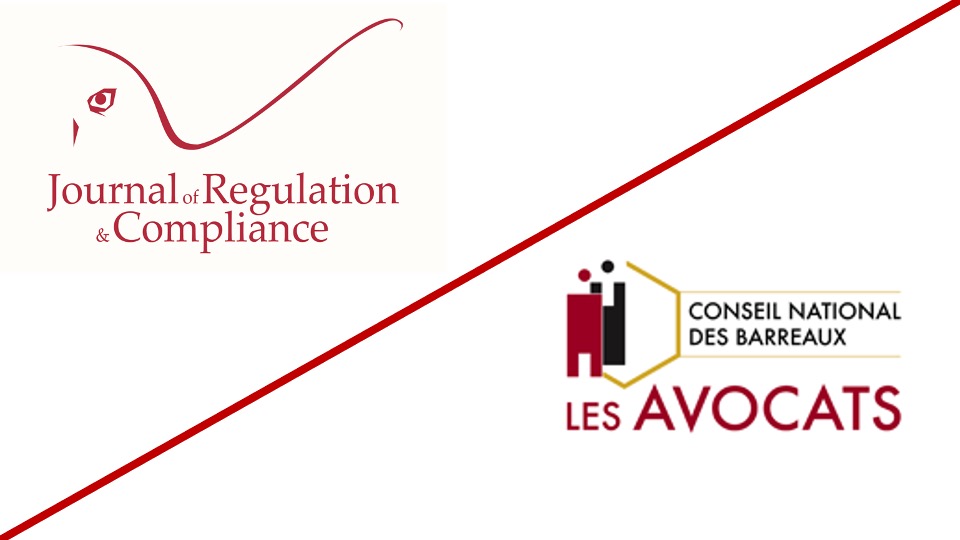
____
► Interviennent :
🎤Matthieu Boissavy, avocat au Barreau de Paris, vice-président de la Commission Liberté et droits de l'homme du CNB
🎤Matthieu Brochier, avocat au Barreau de Paris
🎤Stéphanie Brunengo, avocate au Barreau d'Aix-en-Provence, médiatrice
🎤Malik Chapuis, juge à la 3ième chambre civile du Tribunal judiciaire de Paris
🎤Lucie Chatelain, responsable contentieux et plaidoyer SHERPA
🎤Bruno Deffains, professeur à l'Université Paris Panthéon-Assas
🎤Hirbod Dehghani-Azar, avocat au Barreau de Paris, président de la Commission Modes alternatifs de règlements des Règlements (MARD) du CNB
🎤Marie-Anne Frison-Roche, professeure de Droit de la Régulation et de la Compliance, directrice du Journal of Regulation & Compliance (JoRC)
🎤Jérôme Gavaudan, président du CNB
🎤Thibault Goujon-Bethan, professeur à l'Université Jean Moulin Lyon 3
🎤Céline Haye Kioussis, directrice juridique du Groupe BPCE
🎤Laurence Joly, avocate au Barreau de Thonon-les-Bains
🎤Stéphane de Navacelle, avocat au Barreau de Paris
🎤Lori Roussey, Data Protection Officer, fondatrice et Directrice de Data Rights
🎤Stephanie Smatt Pinelli, directrice juridique Contentieux, groupe Orano
____
Lire une présentation détaillée de la manifestation ci-dessous⤵️
Nov. 30, 2023
Conferences
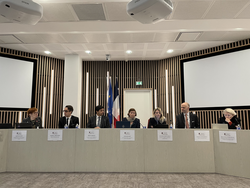
🌐follow Marie-Anne Frison-Roche on LinkedIn
🌐subscribe to the Newsletter MAFR Regulation, Compliance, Law
____
► Full Reference: M.-A. Frison-Roche, "Conclusion", in M. Boissavy, H. Dehghani-Azar, and M.-A. Frison-Roche (dir.), Journal of Regulation & Compliance (JoRC) and Conseil national des Barreaux (CNB), Compliance, vigilance et médiation (Compliance, Vigilance and Mediation), Amphitheatre of the Conseil national des Barreaux, November 30, 2023.
____
🧮see the full programme of this event
________
Nov. 16, 2023
Thesaurus : 01. Conseil constitutionnel
► Full Reference: Conseil constitutionnel (French Constitutional Council), November 16 2023, No. 2023-855 DC, Loi d’orientation et de programmation du ministère de la justice 2023‑2027.
____
🏛️read the decision (in French)
________
Nov. 16, 2023
Thesaurus : Doctrine
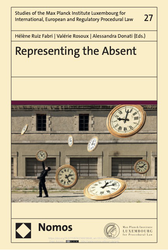
► Référence complète : H. Ruiz Fabri, V. Rosoux et A. Donati (dir.), Representing the Absent, Nomos, coll. "Studies of the Max Planck Institute Luxembourg for International, European and Regulatory Procedural Law", vol. 27, 2023, 496 p.
____
► lire la 4ième de couverture
____
____
► Résumé de l'ouvrage (fait par l'éditeur) : "The ‘absent’ is a notion known in most legal systems. As a legal notion, primarily used in civil law, it refers to one who has left, either temporarily or permanently, their domicile or usual place of residence or business, or whose whereabouts are not known and cannot be ascertained by diligent effort. And yet, the absent may have a family, own a business or property, for whom or which life has to go on. Being absent does not mean having no interest or stake. However, one recurring related issue is determining who can legally speak in the name of, or represent the absent. The book takes root in this idea and widens it by considering the issue of the representation of all those who are not there now, stretching from those who are not there anymore because they have disappeared, to those who are not there yet, because they have not yet appeared. Past and future generations are not only emblematic of both ends of the spectrum but also of the fact that absents can indeed have interests and would therefore need someone to speak in their name/represent them."
(Free translation : "L'absent est une notion connue dans la plupart des systèmes juridiques. En tant que notion juridique, principalement utilisée en droit civil, elle désigne celui qui a quitté, temporairement ou définitivement, son domicile ou son lieu habituel de résidence ou de travail, ou dont le lieu de séjour n'est pas connu et ne peut être déterminé par des efforts diligents. Pourtant, l'absent peut avoir une famille, posséder une entreprise ou un bien, pour lequel ou laquelle la vie doit continuer. Être absent ne signifie pas n'avoir aucun intérêt ou d'enjeu. Cependant, une question récurrente est de savoir qui peut légalement parler au nom de l'absent ou le représenter. Le livre prend racine dans cette idée et l'élargit, en considérant la question de la représentation de tous ceux qui ne sont pas là aujourd'hui, depuis ceux qui ne sont plus là parce qu'ils ont disparu, jusqu'à ceux qui ne sont pas encore là, parce qu'ils ne sont pas encore apparus. Les générations passées et futures ne sont pas seulement emblématiques des deux extrémités du spectre, mais aussi du fait que les absents peuvent en effet avoir des intérêts et auraient donc besoin de quelqu'un pour parler en leur nom/les représenter.")
________
Nov. 9, 2023
Thesaurus : 05. CJCE - CJUE
► Référence complète : CJUE, deuxième chambre, 9 novembre 2023, aff. C-376/22, Google Ireland
____
________
Nov. 9, 2023
Publications

♾️follow Marie-Anne Frison-Roche on LinkedIn
♾️subscribe to the Newsletter MAFR Regulation, Compliance, Law
____
► Full Reference: M.-A. Frison-Roche, "Reinforce the Judge and the Lawyer to impose Compliance Law as a characteristic of the Rule of Law", in M.-A. Frison-Roche (ed.), Compliance Jurisdictionalisation, Journal of Regulation & Compliance (JoRC) and Bruylant, coll. "Compliance & Regulation", to be published.
____
📝read the article
____
🚧read the bilingual Working Paper which is the basis of this article, with additional developments, technical references and hyperlinks
____
📘read a general presentation of the book, Compliance Jurisdictionalisation, in which this article is published
____
► This article is the introduction of the book.
► Summary of the article (done by the Journal of Regulation & Compliance): One can understand that the compliance mechanisms are presented with hostility because they seem designed to keep the judge away, whereas there is no Rule of Law without a judge. Solid arguments present compliance techniques as converging towards the uselessness of the judge (I). Certainly, we come across magistrates, and of all kinds, and powerful ones, but that would be a sign of imperfection: its ex-ante logic has been deployed in all its effectiveness, the judge would no longer be required... And the lawyer would disappear so with him...
This perspective of a world without a judge, without a lawyer and ultimately without Law, where algorithms could organize through multiple processes in Ex Ante the obedience of everyone, the "conformity" of all our behaviors with all the regulatory mass that is applicable to us, supposes that this new branch of Law would be defined as the concentration of processes which gives full effectiveness to all the rules, regardless of their content. But supposing that this engineer's dream is even achievable, it is not possible in a democratic and free world to do without judges and lawyers.
Therefore, it is imperative to recognize their contributions to Compliance Law, related and invaluable contributions (II).
First of all, because a pure Ex Ante never existed and even in the time of the Chinese legists📎!footnote-2689, people were still needed to interpret the regulations because a legal order must always be interpreted Ex Post by who must in any case answer the questions posed by the subjects of law, as soon as the political system admits to attributing to them the right to make claims before the Judge. Secondly the Attorney, whose office, although articulated with the Judge's office, is distinct from the latter, both more restricted and broader since he must appear in all cases where the judicial figure puts himself in square, outside the courts. However, Compliance Law has multiplied this since not only, extending Regulatory Law, it entrusts numerous powers to the administrative authorities, but it also transforms companies into judges, in respect of which the attorneys must deal with.
Even more so, Compliance Law only takes its sense from its Monumental Goals📎!footnote-2690. It is in this that this branch of the Law preserves the freedom of human beings, in the digital space where the techniques of compliance protect them from the power of companies by the way that the Compliance Law forces these companies to use their power to protect people. However, firstly, it is the Judges who, in their diversity📎!footnote-2691, impose as a reference the protection of human beings, either as a limit to the power of compliance tools📎!footnote-2692 or as their very purpose. Secondly, the Attorney, again distinguishing himself from the Judge, if necessary, reminds us that all the parties whose interests are involved must be taken into consideration. In an ever more flexible, soft and dialogical Law, everyone presenting himself as the "advocate" of such and such a monumental goal: the Attorney is legitimate to be the first to occupy this place.
________
Nov. 9, 2023
Publications

🌐follow Marie-Anne Frison-Roche on LinkedIn
🌐subscribe to the Newsletter MAFR Regulation, Compliance, Law
____
► Full Reference: M.-A. Frison-Roche, "Main Aspects of the Book. Compliance Jurisdictionalisation", in M.-A. Frison-Roche, (ed.), Compliance Jurisdictionalisation, Journal of Regulation & Compliance (JoRC) and Bruylant, coll. "Compliance & Regulation", to be published
____
📝This article constitutes the first part of the Introduction of the book; its access is free
____
📘read a general presentation of the book, Compliance Jurisdictionalisation, in which this article is published
____
► Summary of the article (done by the Journal of Regulation & Compliance - JoRC) : This free access article ⤵️ explains firstly the general purpose of the book and secondly how the book is structured in 4 chapters.
Then, thirdly and following the table of contents, this article takes up in a few lines each of the contributions.
This is how the "main aspects" of the book Compliance Jurisdictionalisation become even clearer
____
🔓read this article in full text⤵️
________
Oct. 18, 2023
Thesaurus : 02. Cour de cassation
► Référence complète : Cour de cassation, Première Chambre civile, 18 octobre 2023, n°22-18.926, e-Enfance et La Voix de l'enfant
____
____
📧lire l'article de la Newsletter MAFR Regulation, Compliance, Law sur le sujet : ""
____
► Résumé de l'arrêt :
_______
Oct. 18, 2023
Thesaurus : 02. Cour de cassation
Oct. 4, 2023
Conferences

🌐follow Marie-Anne Frison-Roche on LinkedIn
🌐subscribe to the Newsletter MAFR Regulation, Compliance, Law
____
 ► Full Reference: M.-A. Frison-Roche, "L'avenir du Droit de la compliance" (The futur of Compliance Law), in Cour de cassation (French Court of cassation), La Nuit du Droit 2023, October 4, 2023.
► Full Reference: M.-A. Frison-Roche, "L'avenir du Droit de la compliance" (The futur of Compliance Law), in Cour de cassation (French Court of cassation), La Nuit du Droit 2023, October 4, 2023.
____
🎥 Watch the video (in French)
____
🧮read the full programme of this event
The Cour de cassation (French Court of cassation) had presented 4 successive themes insofar as they affect the future of Law: filiation, artificial intelligence, the environment and compliance.
The President of the Chambre sociale de la Cour de cassation (Social Chamber of the Court of Cassation) gave a presentation on Compliance and the essential role played by the Judge. Then, the Parquet général (Prosecutor General's Office) then asked Fabien Raynaud, Conseiller d'État, about the importance of 'systemic cases' in Compliance Law and the dialogue between judges that it implies, using the Youporn case currently being examined by the judges.
____
► General presentation of the speech: As my work has been seminal for Compliance Law, I was asked about the future of Compliance Law.
________
Oct. 4, 2023
Editorial responsibilities : Direction of the collection "Cours-Série Droit privé", Editions Dalloz (33)
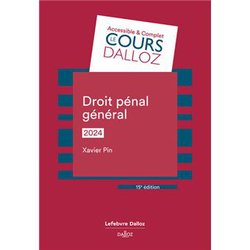
► Référence complète : X. Pin, Droit pénal général, Dalloz, Coll. "Cours Dalloz-Série Droit privé", 15ième éd., 2024, 722 p.
____
► La nouvelle édition pour 2024 de cet ouvrage à jour des dernières réformes, aborde dans un premier temps la "loi pénale", dans sa détermination et dans son application, puis dans un deuxième temps l'ouvrage aborde "l'infraction" avec sa qualification et son imputation pour finir dans une troisième partie sur "la peine", en distinguant entre la peine encourue, la peine prononcée et la peine exécutée.
____
► Voir dans la collection les ouvrages qui s'articulent avec celui-ci :
____
📚Consulter l'ensemble de la collection dans laquelle cet ouvrage est publié.
________
Sept. 28, 2023
Thesaurus : Doctrine
► Référence complète : V. Magnier, "Devoir de vigilance et risques climatiques", in F. Barrière et M. Zolomian (dir.), Le droit des sociétés saisi par le climat, JCP E, n° 39, 28 septembre 2023, pp.18-21.
____
► Résumé de l'article (fait par l'auteure) : "L’introduction des outils de la compliance en droit des sociétés crée une approche juridique binaire : l’une préventive, l’autre de contrôle et de responsabilité. Alors que la loi sur le devoir de vigilance adopte cette double approche, l’analyse révèle qu’en dépit de l’encadrement d’un dispositif préventif ambitieux, la loi sur le devoir de vigilance peine sur le second volet, les contrôle et responsabilité restant lacunaires.".
____
🦉Cet article est accessible en texte intégral pour les personnes inscrites aux enseignements de la Professeure Marie-Anne Frison-Roche
_________
Sept. 28, 2023
Thesaurus : 01. Conseil constitutionnel
► Référence complète : Conseil constitutionnel, 28 septembre 2023, n° 2023-1062 QPC
____
________
Sept. 21, 2023
Thesaurus : Doctrine
► Référence complète : G. Poissonnier, "CJIP avec Technip: peut-on garder les mains propres dans le pétrole ?", JCP E, n° 38, septembre 2023, étude 1267, pp. 52-53
____
► Résumé de l'article (fait par l'auteur) : "Solution. - Une convention judiciaire d’intérêt public (CJIP) conclue par le parquet national financier et la société Technip prévoit le paiement au Trésor public d’une amende de près de 209 millions d’euros pour des faits de corruption d’agents publics étrangers.
Impact. - L’amende prononcée est substantielle mais la CJIP conclue récompense la bonne foi de l’entreprise qui a dénoncé des faits de corruption et a pleinement coopéré avec les autorités judiciaires. La question de la nature de la suite pénale qui sera donnée en cas de réitération de l’infraction est posée."
____
🦉Cet article est accessible en texte intégral pour les personnes inscrites aux enseignements de la Professeure Marie-Anne Frison-Roche
________

Sept. 5, 2023
Publications

🌐follow Marie-Anne Frison-Roche on LinkedIn
🌐subscribe to the Newsletter MAFR Regulation, Compliance, Law
____
 ► Full Reference: M.-A. Frison-Roche, Moving through Time to align Compliance with the rights of the defence, Working Paper, September 2023.
► Full Reference: M.-A. Frison-Roche, Moving through Time to align Compliance with the rights of the defence, Working Paper, September 2023.
____
📕This working paper has been drawn up as the second part of the book Compliance et droits de la défense (Compliance and the rights of the defence), a first section summarising this book.
____
📝This Working Paper was drawn up to serve as a basis for this second section, which sets out the general way in which the rights of the defence and the compliance system can be articulated, thank to this movement of moving back in time.
____
► Summary of this Working Paper: The subject of Compliance & rights of the defence is difficult to pin down because it often gives rise to totally opposing presentations, which express the initial confrontation between Compliance and rights of the defence, which seems irreducible. This initial confrontation must be acknowledged, and this is even more necessary to prevent it from becoming definitive(I)
But in a society governed by the Rule of Law, the rights of the defence are central, and the hierarchy of norms dictates that they remain the privilege of all those who risk being punished in the future. Admittedly, if we look at the course of events in a linear way, the Compliance mechanisms come in Ex Ante, whereas the rights of the defence would only be activated when the repressive procedures would later come to bear on the moral or natural person. The question would therefore not even arise, or not in a central way. But this reasoning creates a false compatibility between Compliance and the rights of the defence (II.
Indeed, it is the perspective of punishment in the future that forms the basis for the attribution of rights of the defence in the present. This consideration of the future not only allows but obliges the Law to "move in time", to always think in advance about what might happen tomorrow: this is how we must think about the Compliance methods of Internal Investigation, the DPA (or in the French legal system the Convention judiciaire d'intérêt public and the French Guilty plea procedure (CRPC) (III). As soon as these Compliance Tools are being used in practice, at the time they are being used, we must already think about how their results will be used, results which they have often been used for, because the Internal Investigation is a formidable piece of Evidence for obtaining a conviction and/or a DPA, etc. : therefore, the rights of the defence must shift over time, from the future to the present of the Information collect.
Two ambiguities that affect Compliance Law itself, ambiguities which the rights of the defence help to clarify, now appear more clearly. The first concerns the place occupied by the consent of the person who could have been protected by the rights of defence but //who exercises his/her will to renounce them (IV). Consent, in relation to the will of which it is the expression, is also linked with the future and allows Compliance once again to take precedence over the prerogatives of the individual who chooses not to benefit from it. The omnipresence of 'consent' in Compliance is enlightening here... The second ambiguity concerns the place of secrecy (V). Secrecy seems to be the prerogative of the rights of the defence. But it can also be an effective Compliance Tool when Confidentiality enables the company to detect and prevent breaches. It may even constitute the very Monumental Goal of Compliance Law. This happens when the Goal of Compliance Law, in which legal normativity is placed, becomes the protection of the individual, as is the case for personal information. That guides the European Judge, in line with the humanism that underpins European Compliance Law, in finding the right balance, this protection and effectiveness, depending on whether the information must be given or must be not.
____
🔓read the Working Paper developments below ⤵️
July 15, 2023
Newsletter MAFR - Law, Compliance, Regulation

♾️suivre Marie-Anne Frison-Roche sur LinkedIn
♾️s'abonner à la Newsletter MAFR Regulation, Compliance, Law
____
► Référence complète : M.-A. Frison-Roche, "Compliance & Contrat / lien entre Consentement et Volonté ; enjeu de responsabilité personnelle : CNIL, 15 juin 2023, Criteo", Newsletter MAFR Law, Compliance, Regulation, 15 juillet 2023.
____
📧Lire par abonnement gratuit d'autres news de la Newsletter MAFR - Law, Compliance, Regulation
____
🧱L'obligation légale de Compliance doit être exécutée grâce à des contrats, mais l'on ne peut s'en décharger par des contrats : CNIL, 15 juin 2023, Criteo
____
📧lire l'article ⤵️
July 8, 2023
Newsletter MAFR - Law, Compliance, Regulation

♾️suivre Marie-Anne Frison-Roche sur LinkedIn
♾️s'abonner à la Newsletter MAFR Regulation, Compliance, Law
____
► Référence complète : M.-A. Frison-Roche, "Présent et avenir des "causes systémiques" : cas des sites pornos (jugement 7 juillet 2023)", Newsletter MAFR Law, Compliance, Regulation, 8 juillet 2023.
____
📧Lire par abonnement gratuit d'autres news de la Newsletter MAFR - Law, Compliance, Regulation
____
🧱Consécration de la notion proposée de "cause systémique" dans les contentieux de Droit de la compliance : jugement du Tribunal judiciaire de Paris du 7 juillet 2023, "Youporn" (Arcom c/ Orange et autres)
Ce jugement remet de l'ordre et sursoit à statuer pour permettre au Conseil d'État de statuer sur ce qui est la même question impliquant le système numérique, les obligations des plateformes, la technologie. L'office du juge est en pleine transformation lorsque la Compliance est impliquée et que les systèmes eux-mêmes sont en jeu.
____
📧lire l'article ⤵️
July 6, 2023
Thesaurus : 08. Juridictions du fond
► Référence complète : TJ Paris, 5ème chambre, 2ème section, ordonnance du juge de la mise en état, 6 juillet 2023, n° RG 22/03403, TotalÉnergies
____
________
July 5, 2023
Interviews

♾️follow Marie-Anne Frison-Roche on LinkedIn
♾️subscribe to the Newsletter MAFR Regulation, Compliance, Law
____
► Full Reference: M.-A. Frison-Roche et A. Seban, "Compliance : les cours suprêmes s’emparent de la question de ses enjeux juridictionnels" ("Compliance : the Supreme Courts take up the issue of its jurisdictional implications"), interview with Olivia Dufour, Actu-Juridique, 5 July 2023.
____
💬read the interview (in French)
____
► Presentation of the interview by the journal (in French): "Le 2 juin dernier s’est tenu au Conseil d’État un colloque fondateur sur le rôle du juge dans la compliance. Le professeur Marie-Anne Frison-Roche et le conseiller d’État Alain Seban, qui ont tout deux contribué aux débats, ont accepté de commenter les principaux enseignements des travaux de cette journée."
____
► Questions asked (in French):
- Le colloque « De la régulation à la compliance, quel rôle pour les juges » qui s’est tenu au Conseil d’État le 2 juin dernier a rassemblé juges civils et administratifs. En quoi le juge administratif est-il concerné par la compliance qui semble plutôt une affaire d’entreprises et donc de justice civile et commerciale ?
- Vincent Vigneau, président de la chambre commerciale de la Cour de cassation rappelle que la compliance a plutôt vocation à éviter le juge en se situant ex ante, pourtant on découvre que le juge lui-même accepte de plus en plus de se prononcer en ex ante… qu’en est-il ?
- Quel peut donc être le rôle du juge dans la compliance ? Peut-il contribuer à faire émerger un droit de la compliance et à l’harmoniser ?
- François Ancel semble considérer que le rôle juge va devoir adapter son office à la compliance, il évoque trois concepts : téléologique, soutenabilité et efficacité…
- Le juge dispose-t-il en l’état de tous les outils nécessaires ? Si tel n’est pas le cas, que faut-il créer ?
- En quoi le dialogue des juges, civil/administratif, national/européen, national/international, est-il important ?
- Que veut dire F. Ancel quand il déclare que le juge doit évoluer du constat à la trajectoire ?
- Existe-t-il des domaines où la compliance entre en conflit avec des principes processuels, par exemple le principe de légalité des peines ?
- En quoi la notion de « buts monumentaux », que vous avez créée en 2016, a-t-elle trouvé sa place dans le droit ?
________
July 3, 2023
Newsletter MAFR - Law, Compliance, Regulation

♾️suivre Marie-Anne Frison-Roche sur LinkedIn
♾️s'abonner à la Newsletter MAFR Regulation, Compliance, Law
____
► Référence complète : M.-A. Frison-Roche, "Compliance. CJIP : le calcul de l'amende d'intérêt public / CJIP, Vercel (Lactalis), 30 mars 2023", Newsletter MAFR Law, Compliance, Regulation, 3 juillet 2023.
____
📧Lire par abonnement gratuit d'autres news de la Newsletter MAFR - Law, Compliance, Regulation
____
🧱 Si l'entreprise n'a pas directement gagné d'argent, quel peut être le montant de l'amende d'intérêt public fixé par une CJIP ? Analyse de la CJIP du 30 mars 2023 Groupe Lactalis, validée par l'ordonnance du Président du Tribunal de Besançon du 1ier juin 2023.
____
📧lire l'article ⤵️
June 28, 2023
Newsletter MAFR - Law, Compliance, Regulation

♾️suivre Marie-Anne Frison-Roche sur LinkedIn
♾️s'abonner à la Newsletter MAFR Regulation, Compliance, Law
____
► Référence complète : M.-A. Frison-Roche, "S'engager n'est pas contracter (décision du Conseil d'État du 21 avril 2023, Orange c/ Arcep)", Newsletter MAFR Law, Compliance, Regulation, 28 juin 2023.
____
📧Lire par abonnement gratuit d'autres news de la Newsletter MAFR - Law, Compliance, Regulation
____
🔴Engagements, acceptation, convention : multiplication de ces actes de volonté acceptés qui ne sont pourtant pas des contrats et échappent à leurs principes
Dans sa décision du 21 avril 2023, société Orangec/ Arcep, le Conseil d'État dit ce que ne constitue pas les engagements souscrits par l'opérateurs pour le déploiement de la fibre, acceptés par le ministre : ce n'est pas un contrat. La "qualification négative" est donc donnée. Mais alors qu'est-ce que c'est ?
____
📧lire l'article ⤵️
June 22, 2023
Thesaurus : 05. CJCE - CJUE
► Full Reference: CJUE, 1st Chamber, 22 June 2023, C-579/21, Pankki S.
____
________